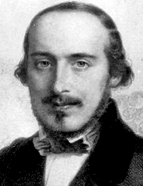

He returned to Lisbon and between 1842 and 1843 wrote every week for the Revista Universal Lisbonense, edited by António Feliciano Castilho, in which he published his novel Rausso por Homízio, a work that brought him to the attention of Lisbon society. In the same period he became friends with Alexandre Herculano, becoming a regular visitor to the Ajuda Library and collaborating on the review O Panorama. The renowned historian, who refined methodologically the critical documental approach and was averse to the mythical tradition, contributed hugely to the development of Rebelo da Silva’s thought and historiographical practice. Herculano also represented a valuable source of legitimation, which his young disciple knew how to instrumentalize to assert himself in the scientific and institutional field. Out of loyalty, but above all out of conviction, he became involved in the controversy surrounding the omission of the “Miracle of Ourique” from the História de Portugal (History of Portugal). Entering the lists in defence of his friend and master, he published the Cartas ao Sr. Ministro da Justiça, sobre o uso que faz do púlpito e da imprensa uma fracção do clero português (Letters to the Minister of Justice on the use made by a section of the Portuguese clergy of the pulpit and the press) (1850) in which he criticized the manipulation of the masses as practised by some sectors of the Church who censored works which, allegedly, would offend religion.
From the 1850s on, Rebelo da Silva planned his first works of a historiographical nature. In this phase he preferred working in the area of literary and biographical history where he showed himself to be particularly mindful of how the context acted on individuals. (Jorge Borges de Macedo, A «História de Portugal nos Séculos XVII e XVIII» e o seu Autor, 1971, p.84.) His approach followed the principles of Sainte-Beuve’s critical method which was based on the principle that an author’s work was always the reflection of his life and could be explained through it. This was a method that was criticized by Marcel Proust (Contre Sainte-Beuve, Paris, 1965), among others. In 1850, probably through Alexandre Herculano’s intervention, the Lisbon Royal Academy of Sciences charged him with the task of continuing publication of the Quadro elementar das relações políticas e diplomáticas de Portugal (Basic Framework of political and diplomatic relations of Portugal) which had been begun by the Viscount of Santarém, who had since died. This historian had already made a name for himself earlier through his efforts at objectivity, and preceded Herculano in the systematic publication of sources. The young historian, Rebelo da Silva, was praised by D. Pedro V for his success in completing the task he had been given.
